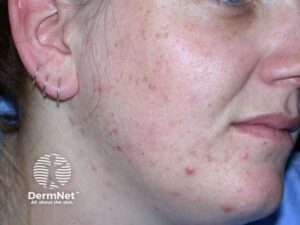
🧠 Why Do Adult’s Get Acne? Particularly Women
One of the most common reasons people come to see us is for acne – and especially women who are in the late-twenties to forties. We recently conducted a review of clinical studies and together with our dermatological experience, we explore the question – “Why do adult women get acne? and what can we do about it?”.
1. Adult Acne is More Common Than You Think
Epidemiology shows rates of adult acne in women range from 15% to 20% globally, with some studies reporting up to 54% prevalence depending on age and population (ref).
In some UK cohorts, 82% of adult acne cases began during adolescence and persisted into adulthood—termed “persistent acne”.
That “second puberty” in your 20s and 30s—reflecting hormonal fluctuation, lifestyle stress, or skincare changes—is a documented phenomenon and a frequent trigger. We see this reflected in our patients, where stress of university or new professional jobs exacerbates the breakouts – as can pregnancy/post-pregnancy hormonal changes.
2. The Key Drivers: Hormones, Genes & Diet
Hyperandrogenism and elevated IGF‑1 (linked to sugar and high‑glycaemic diets) strongly drive adult acne by increasing sebum production and follicular inflammation PubMed.
A family history of acne also increases risk—genetics explain much of the variation between individuals OxfordAcademic.
Stress-related neuropeptide activity, especially before the period, further exacerbates breakouts in hormone-sensitive skin. The stress response, particularly in adult acne should not be ignoreed Indian J.
3. How Adult Acne Differs from Teen Acne
It is often more inflammatory, with nodules and cysts around the jawline or cheeks, rather than comedones (blackheads/whiteheads) Pubmed.
Post-inflammatory hyperpigmentation and scarring are more common, particularly in skin of colour. Hyperpigmentation is often cied as a key concern.

Photo credit: NZ Dermnet
🔬 What Does Research Say Works Best?
Evidence-Based At-Home and Clinical Treatments for Adult Acne
A. Topical Therapies (Over the Counter & Prescription)
Retinoids are first-line: they suppress oil, normalise cell turnover, reduce inflammation, and address pigmentation. Prescription level retinoids are often required to take control of adult acne in the first instance as they are well tolerated and effective on comedonal acne Wiley Online Library
Benzoyl peroxide and salicylic acid are clinically proven to reduce C. acnes bacteria and unclog pores—often used in combination with retinoids or moisturisers to improve results. We recommend Acnecide, which you can pick up from Boots and look for any cleansers with salicylic acid to help.
B. Hormonal & Systemic Treatments
Hormonal oral medications and oral contraceptives, particularly combined pills, reduce androgen-driven sebum and inflammatory lesions—often considered first-line for hormonal adult acne. We see 40–70% lesion reduction at six months, and 85% of our patients have full clearance at the year mark, through closely monitored hormonal medications prescribed only by dermatologists.
C. Procedural & Adjunctive Treatments
Combination topical therapies (e.g. benzoyl with retinoid) outperform monotherapy and reduce resistance risks JAAD.
Laser and light-based treatments, while not first line, can be effective—particularly for those looking for prescription-free routes or addressing persistent nodules. Emerging technologies like AviClear are designed to target oil production at the source Frontiers.
Microneedling, peels, and energy-based treatments help with scarring and pigmentation, especially helpful after acute inflammation has settled Frontiers. We see microneedling as being particularly helpful at reducing the last remanents of acne, together with the scarring.
D. Lifestyle & Dietary Support
Clinical reviews highlight that low-glycaemic diets, rich in whole foods and omega‑3s, may reduce IGF‑1 mediated sebum and inflammation and support acne control Wiley Online Library.
Stress management and sleep quality play an indirect but important role via neuropeptide modulation and skin–brain cross-talk pathways PMCarXiv.
Evidence for probiotics, tea tree, or herbal remedies remains limited and inconsistent—if it helps you, that’s great but caution is advised if you’re seeking it out as a new treatment. Albeit, if you are on medications the doctor may advise probiotics to protect your gut health from the side effects of medications.
Summary
| Cause | Key Mechanism | Proven Support |
|---|---|---|
| Hormonal imbalance, IGF‑1, genetics | Increases sebum and inflammation | Retinoids, hormonal medications, diet changes |
| Persistent adolescence onset | Long‑term inflammation | Combination topical/systemic treatments |
| Inflammatory type adult acne | Nodules, pigmentation, scarring | Procedural treatments, lasers, expert dermatology care |
| Stress, diet, lifestyle | Neuropeptides and metabolic triggers | Lifestyle support, dietary tweaks, holistic skin plans |
What This Means for You
If you’ve had acne for years, prescription retinoids, laser and hormonal therapies remain gold‑standard. A dermatology consultation is a MUST if this is you.
If your breakouts appeared recently, or you’re avoiding systemic meds, procedural routes like AviClear or acne clearing facials could be a smart option.
From home: a gentle but effective OTC routine + low-glycaemic, plant-forward diet + stress management offers solid symptom support. Manage your expectations with topical treatments that are available over the counter as you may need something stronger from the dermatologist, but it is a good start.
If scars or pigmentation linger, expert aftercare—including peels, microneedling or medical-grade lasers—can help restore texture and tone.
If you’re reading this and nodding along, you’re already ahead. The next step? A clear diagnosis to match your skin’s story. Whether you start with expert skincare advice or bring in dermatology-led options, an informed, layered plan is the only way to build long-term skin confidence.
We can support your skin both online and in clinic. Please reach out for support or book a dermatology consultation online. All our contact details are here/call us on 02039411815 and we will be happy to guide you to what is best for your skin specifically.
Health, happy skin – always.
Cofounder, No.23 Skin
02039411815

NB: please note this blog post is for information only should not be used in place of any specific medical advice. If you have a skin concern, including acne, then we ask that you seek medical support – through your GP, dermatologist, or by booking in with us for a formal appointment.